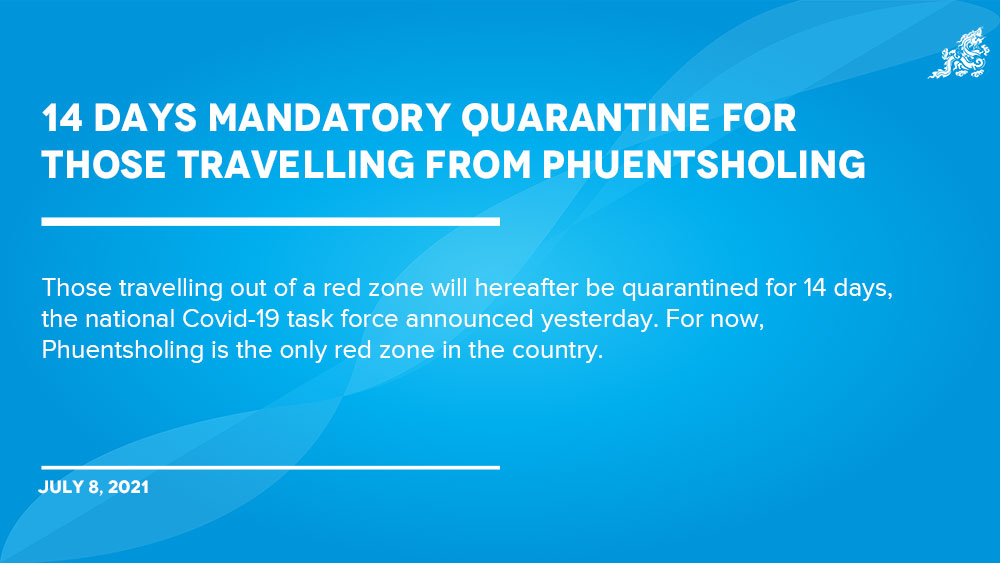Younten Tshedup
Those travelling out of a red zone will hereafter be quarantined for 14 days, the national Covid-19 task force announced yesterday. For now, Phuentsholing is the only red zone in the country.
The national Covid-19 taskforce in light of the ongoing outbreak and disease prevalence in the country revised the quarantine guidelines and testing duration. As per the new guideline, anyone travelling from red zone areas identified in the high-risk areas will have to undergo 14 days mandatory quarantine before travelling to lower risk areas.
Entire Phuentsholing area was identified as red-zone as it continued to detect positive cases from the community. In the last 24 hours, five new cases were detected from the flu clinics in Phuentsholing.
A member of the technical advisory group (TAG), Dr Tshokey, said that the guideline was revised as a precautionary measure to minimize the risk of transmission and prevent possible outbreaks in the low-risk areas.
Dr Tshokey said that the country was divided in two risk zones — high and low. All the bordering areas are classified as high-risk areas and that travelling from high-risk to low-risk areas required mandatory quarantining.
However, within the high-risk areas, places were identified as red, yellow, and green zones depending on the disease phase.
“Gelephu has not reported any positive case from the community so far, which is why we have identified Gelephu and Sarpang as a green zone within the high-risk area,” he said. “Anyone travelling from Gelephu will have to stay in quarantine for seven days while moving to lower-risk areas.”
Similarly, for Samdrupjongkhar, he said that people will be quarantined for seven days since there was no active transmission of the virus for now. “But for Phuentsholing, as the community is still detecting positive cases, it has been identified as a red zone. Anyone travelling from Phuentsholing will have to undergo a 14-day quarantine.”
Dr Tshokey said that some places such as Gomtu in Samtse and Nganglam in Pemagatshel were categorised as yellow zones. He said that after a recent outbreak in these places, the disease, for now, was partially under control. “This is why, anyone travelling from the yellow zones of the high-risk areas to lower risk places will have to undergo a 10-day quarantine period.”
Given the volatile situation and increasing spread of the Delta variant of SARS-CoV-2 virus in the country, TAG had recommended increasing the quarantine period from seven days to 10 or 14 days.
Health officials said that the existing protocols and regulations needed to be updated in line with the changing pandemic situation. “In order to keep up with the fast-mutating virus, we also need to enhance and revise our strategies accordingly,” said an official.
He added: “What worked for us in the past is no more effective. We have to adapt and evolve together with the pandemic situation. Otherwise, it would be an uphill and overwhelming task to contain this virus.”
Last year, the government increased the quarantine period for people coming in from abroad to 21 days from the initially accepted 14 days. “The decision was based on science and studies. We don’t decide anything without evidence. Changes to the existing quarantine protocol for internal travel was also felt necessary in order to secure the rest of the country,” said a health official.
In the meantime, two individuals travelling from Phuentsholing to Thimphu recently tested positive for Covid-19 while inside the quarantine facility. The two, including several others were tested and escorted to Thimphu and other places to be placed in quarantine centres.
Unlike in the past where individuals were first quarantined for seven days in their respective origin of place (high-risk areas) before allowing them to travel, people are now escorted to various other places to be quarantined. This is because of the shortage of quarantine centres in places like Phuentsholing and Samtse.
The two individuals tested negative on the RT-PCR test before they were escorted to Thimphu from Phuentsholing. However, it was learnt that they later turned positive while in the quarantine in Thimphu.
Officials said that in order to avoid such incidents, which could have a huge bearing on the country’s containment efforts, the need to revise the quarantine protocol was felt necessary.
Edited by Tshering Palden


